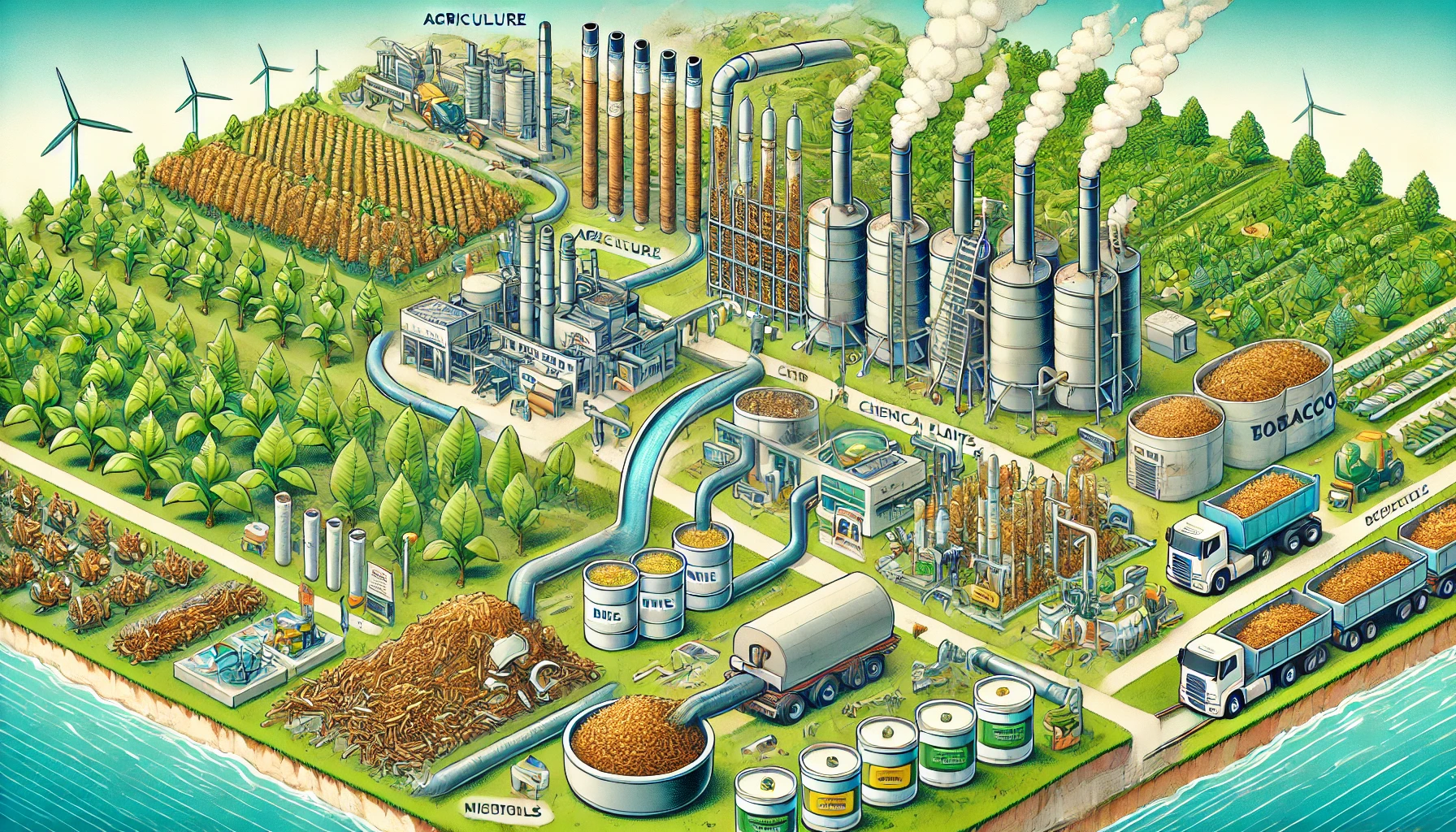Beyond Cigarettes: The Growing Value of Tobacco Waste in Agriculture and Energy
Tobacco waste holds significant potential for use in agriculture, medicine, chemical engineering, and energy sectors, offering sustainable alternatives to traditional practices. By harnessing bioactive compounds, it can be transformed into valuable products like biofuels, fertilizers, and medical compounds, reducing environmental impact and promoting economic efficiency.

A recent review article, conducted by researchers from China Tobacco Zhejiang Industrial Co. Ltd. and the College of Chemical Engineering at Zhejiang University of Technology, delves into the overlooked potential of tobacco waste as a valuable resource across various industries. Historically seen as an environmental burden, tobacco waste is often incinerated or dumped in landfills, contributing to air pollution and soil degradation. However, this review emphasizes that tobacco waste contains a variety of bioactive compounds and materials that can be harnessed in agriculture, medicine, chemical engineering, and energy sectors. The tobacco industry generates significant waste, much of which has been limited to low-value applications such as reconstituted tobacco sheets or fertilizers. But recent research reveals that this waste has untapped potential, especially in the context of sustainable development and energy efficiency, offering a range of opportunities for reducing environmental harm while increasing economic output.
Agriculture Benefits from Tobacco Waste
In agriculture, tobacco waste is commonly used as a fertilizer and pesticide. The review explains how composting tobacco waste can degrade harmful substances, such as nicotine, resulting in pollution-free bioorganic fertilizer. This approach not only helps mitigate the environmental issues caused by organic waste but also reduces the cost of producing biofertilizers. Recent studies have demonstrated that composting tobacco waste alongside other organic materials, like vegetable waste and industrial effluent, enhances the nutrient profile of the resulting fertilizer. Tobacco waste can also be used to create biopesticides, which provide an environmentally friendly alternative to chemical pesticides. Unlike conventional insecticides that contribute to pest resistance, biopesticides derived from tobacco waste offer effective pest control with lower environmental impact. For example, tobacco alkaloids and essential oils found in tobacco waste can be cultivated to produce biopesticides that are particularly useful in protecting stored tobacco products from pests.
Medical Applications of Tobacco-Derived Compounds
In the medical field, tobacco waste has shown promise due to its abundance of bioactive compounds such as phenols, solanesol, polysaccharides, alkaloids, and proteins. These compounds are extracted through modern techniques such as ultrasonic-assisted extraction, supercritical extraction, and high-pressure liquid extraction, maximizing yields and preserving their bioactive properties. Phenols, which are abundant in tobacco, possess potent antioxidant properties and have been linked to anti-aging, anti-inflammatory, and cancer-preventive effects. Chlorogenic acid, a prominent phenolic compound in tobacco, has been shown to lower blood sugar levels and improve liver function in preclinical studies. Additionally, solanesol, an aliphatic terpene alcohol found in tobacco, is a key ingredient in the production of coenzyme Q10 and vitamin K2. Coenzyme Q10 has anti-inflammatory and antioxidant properties, while vitamin K2 plays an important role in bone health and preventing cardiovascular diseases. The review also highlights the medical potential of nicotine, which, despite being harmful in large amounts, is used in nicotine patches and tablets to help people quit smoking. Moreover, there is ongoing research into the use of nicotine in treating neurological conditions such as Alzheimer's and Parkinson's diseases, though its therapeutic use remains controversial.
Chemical Industry Leverages Tobacco Waste
In the chemical and energy sectors, tobacco waste holds significant potential for producing valuable chemical platform compounds such as levulinic acid and furfural. These compounds are derived from the lignocellulosic components of tobacco waste and can be refined into various high-value products like biofuels, adhesives, and resins. For example, levulinic acid can be processed into ethylene glycol, a compound widely used in the chemical industry, while furfural can be used in the production of fungicides, lubricants, and flavor compounds. Biomass derived from tobacco waste offers several advantages over traditional energy sources, including lower costs, reduced pollution, and a high rate of recyclability. The review also discusses how tobacco waste can be converted into bio-coal, bio-oil, and biogas, offering sustainable alternatives to fossil fuels. Studies show that biomass-based coal from tobacco waste performs similarly to conventional coal in high-temperature curing but with significantly lower emissions of carbon dioxide, sulfur dioxide, and carbon monoxide. Bio-oil produced through the pyrolysis of tobacco waste contains fewer harmful components than tobacco smoke, making it a viable resource for energy production.
Tobacco Waste Fuels Enzyme Production
The potential of tobacco waste in enzyme production is another promising area discussed in the review. Solid-state fermentation using lignocellulosic residues from tobacco waste has been shown to enhance the production of enzymes like cellulase, which can be used for bioconversion processes. The review cites examples of research where microorganisms such as Rhizobium spp. and Streptomyces spp. were used to improve the extraction of bioactive compounds and enzymes from tobacco waste, further demonstrating its versatility.
Future Outlook for Tobacco Waste Utilization
Despite these promising applications, the utilization of tobacco waste remains limited. The review underscores the need for continued research and development to fully unlock the potential of this resource. As industries increasingly shift toward sustainable practices, the authors argue that tobacco waste could play a pivotal role in advancing both economic efficiency and environmental sustainability. By exploring new ways to use tobacco waste in agriculture, medicine, chemical engineering, and energy production, industries can reduce waste while generating valuable products and energy sources.
- FIRST PUBLISHED IN:
- Devdiscourse










